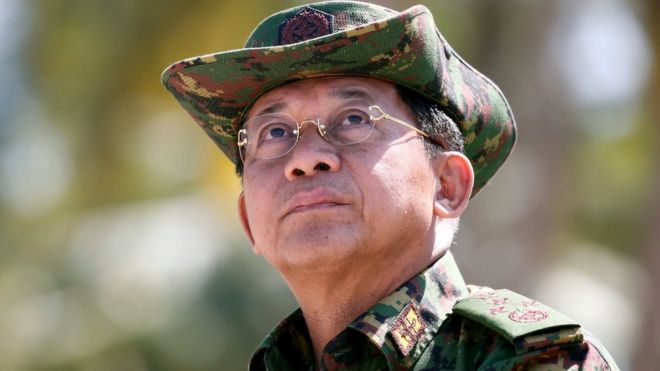 |
| Myanmar's Commander-in-Chief Min Aung Hlaing, and other top military figures, are accused of continuing violations |
The US has imposed sanctions on Myanmar's top general and three senior officers, accusing them of human rights violations against Rohingya Muslims.
The generals and their families are banned from entering the US.
Secretary of State Mike Pompeo said there was credible evidence that the generals were involved in the violent crackdown on the Rohingya minority in 2017, and that abuses were continuing.
Myanmar's government and military condemned the sanctions.
Brigadier General Zaw Min Tun told Reuters news agency that an army-led investigation into the 2017 violence was ongoing.
But Mr Pompeo said the sanctions had been prompted in part by Commander-in-Chief Min Aung Hlaing's recent decision to release, after just a few months, soldiers convicted of extra judicial killings at the village of Inn Din in 2017.
They spent less time behind bars than two Reuters journalists, Wa Lone and Kyaw Soe Oe, who had been investigating the massacre. The two reporters spent more than 16 months in prison on charges of obtaining state secrets before being released in an amnesty on 6 May.
Correspondents say the military still wields considerable influence in Myanmar, also known as Burma.
Mr Pompeo said: "We remain concerned that the Burmese government has taken no actions to hold accountable those responsible for human rights violations and abuses, and there are continued reports of the Burmese military committing human rights violations."
He said the US was "the first government to publicly take action with respect to the most senior leadership of the Burmese military", and that there was "credible information of these commanders' involvement in gross violations of human rights".
The BBC's Nick Beake in Myanmar says the ban is largely symbolic and could have gone further to include financial sanctions targeting military-owned assets.
More than 700,000 Rohingyas fled Myanmar during the 2017 crackdown, amid reports of massacres, widespread rape and the burning of villages. The UN has said top military figures must be investigated for genocide.
The Myanmar government has said the army was responding to attacks by Rohingya militants.
Source: BBCNews

No comments:
Post a Comment
Add a Comment...